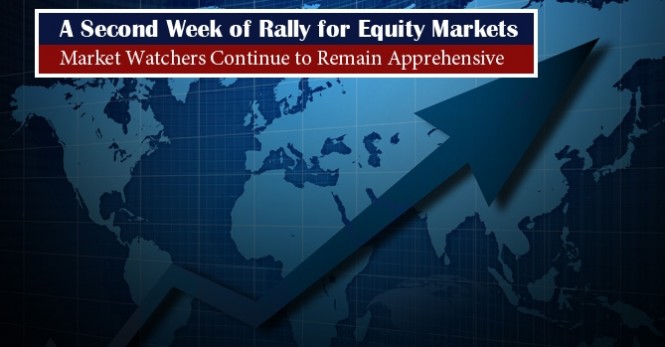 Markets This Week
Markets This Week
It was a second week of rally for the Indian equity markets but the marginal increase failed to gladden retail investors and market watchers continue to remain apprehensive. The benchmark 30 scrip BSE Sensex closed Friday’s trading session at 27,324 points, an increase of 218.61 points or 0.8 percent over last week’s closing level (27,105.39 points). The NSE’s lead index, 50 scrip CNX Nifty also closed in the green at 8,262.35 points, a growth of 70.85 points or 0.86 points over the previous week (closing at 8,191.5 points). Market watchers predict better returns for long-term investors at the equity markets.
The stabilisation of the markets this week can be attributed to the recovery of the domestic currency against the dollar and to strong global trends. Market sentiments received a boost with the Finance Minister, Arun Jaitley, expressing confidence in the recovery of the economy. He said that both the fiscal deficit and inflation rates were well under control. Earlier this week, Japan confirmed the return of El Nino this year causing worry for the agricultural sector. The South West monsoons are likely to hit Kerala by month’s end.
Data released this week also show that exports had a poor beginning this fiscal year. Exports in April shrunk for the fifth consecutive month. In April, India’s exports dwindled 14 percent year-on-year to USD 22 billion. Major export items including precious gems, jewellery, plastics, and petroleum products declined and engineering goods that are exported failed to register a growth. Imports in April also contracted 7.5 percent to about USD 33 billion. Gold imports too have scaled down to about USD 3.1 billion in April 2015, down from USD 4.98 billion in March. India’s trade deficit which was at a five month high in March at about USD 11.79 billion also declined marginally to USD 11 billion in April.
SBI, Axis Bank to Launch ‘Tap & Pay’ Cards
This week, India’s central bank, the RBI eased its electronic payment norms, allowing for ‘tap and pay’ transactions with contactless cards. These ‘tap and pay’ cards make use of near-field communication (NFC) systems and allow a bank customer to make a payment of up to INR 2000 without the need to enter an authentication PIN (called Additional Factor Authentication). Soon after receiving the RBI’s clearance, India’s largest bank, the State Bank of India (SBI) launched sbiNTOUCH (contactless debit cards) and SBI Signature (contactless credit cards). These cards need not be swiped in the usual fashion. Payments can be made by tapping them or waving them near the contactless card reader at any point of sales (POS). SBI has about 5000 such POS that accept contactless cards in major cities and plans on increasing this number. Soon after SBI’s launch, Axis Bank announced that it shall also be incorporating the NFC technology into its debit and credit cards soon. The bank also committed to upgrading about 50,000 POS terminals to ensure that these contactless cards are accepted.
Bad Loans Still a Worry: RBI
Bad loans continue to plague the banking sector, and the worry is far from over, said RBI Governor, Raghuram Rajan this week. This comes close on the heels of a warning issued to Indian banks by credit rating companies Crisil Rating and Moody’s. The companies said that gross bad debt of the banks in the country is likely to go up soon. Rajan, however, assured the banks that the RBI would work closely with these lending institutions to identify and resolve the issue of non-performing assets (NPAs). About 29 of the 39 publicly traded banks of India have declared Q4 earnings as of now and the bad debt scenario in these banks have started to worry market watchers.
WPI Inflation Falls to -2.65 percent
Official data released this week revealed that wholesale price inflation declined to -2.65 percent in April 2015 from -2.33 percent in March 2015. The decline is attributed to a fall in crude oil prices and the prices of minerals. Retail inflation also seems to have had cooled off to a four month low in April. Industrial output growth in March also declined to a five month low. The increase in food prices seems to have hit a stumbling stone. In all, corporate India is convinced that the environment is right for an interest rate cut by the central bank and RBI’s credit review in early June is eagerly awaited.
PM Sells ‘Make In India’ To China
Prime Minster Narendra Modi in his historic visit to China made a hard-selling pitch to Chinese CEOs and business heads in Shanghai on Saturday showcasing the ‘Make in India’ campaign. On Saturday alone, over 21 trade agreements were signed by the Indian and Chinese companies. The total worth of these deals is estimated to be over USD 22 billion. If China is the factory of the world, India is its back office, said the PM. Modi met 22 CEOs of some of the top Chinese companies such as Xiomi, Huawei, and Alibaba and also addressed 200 other businessmen, economists and corporate heads in the country.
Airbus Bags USD 1.9bn Order from India
India’s Ministry of Defence has agreed to procure about 56 C295 transport planes worth INR 199.30 billion or USD 1.87 billion from Airbus Group NV. The bid came in from Airbus in association with India’s Tata Advanced Systems and was approved by the MOD’s defence acquisition council. This is part of the NaMo administration’s attempt to stage a major upgrade of India’s military capabilities. Under the current proposal, Airbus is likely to supply India 16 twin-turboprop aircraft in “fly-away condition”. Tata shall assemble the remaining transport crafts in Hyderabad through a technology transfer from Airbus. Despite this, the Modi government remains keen on encouraging domestic production to meet the military needs of the nation.





